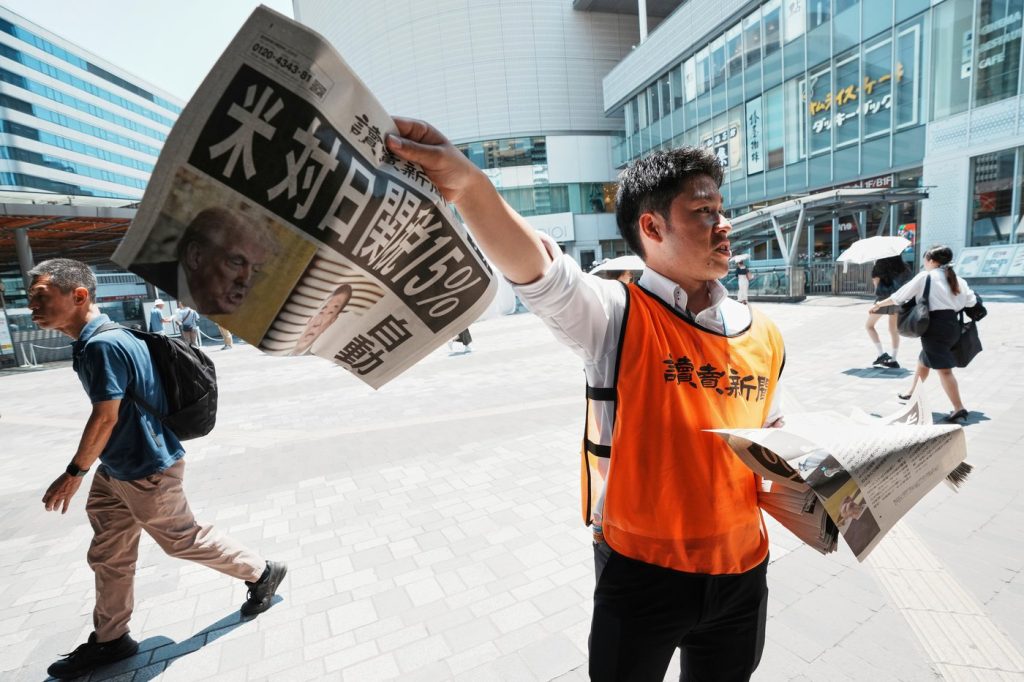In a recent announcement, President Donald Trump claimed that Japan is willing to invest $550 billion in the United States as part of a new trade framework. This figure, although impressive, remains in the negotiation phase and may not be as guaranteed as Trump presents it to be. He characterized this investment as "seed money," suggesting it would help facilitate a reduction in tariffs from 25% to 15% on Japanese goods.
Trump remarked, "Japan is putting up $550 billion in order to lower their tariffs a little bit," adding that 90% of any profits generated from this investment would accrue to the U.S. despite Japan providing the initial funding. He emphasized that this arrangement is neither a loan nor a conventional investment but rather a "signing bonus." A White House official has noted that the specific terms are still being negotiated and have not been officially documented.
The proposed $550 billion investment is significant, representing over 10% of Japan's gross domestic product (GDP). The Japan External Trade Organization estimated that direct investments into the U.S. economy reached $780 billion in 2023, creating questions regarding how much of this new investment is novel versus a reallocation of existing commitments.
While this trade framework serves as a major talking point for the Trump administration, the promised influx of investments has yet to manifest in measurable data concerning employment, construction, or manufacturing output. Moreover, the framework also allows Trump to argue that other nations are agreeing to tax their goods, even though these costs may ultimately affect American consumers.
According to Japan's Cabinet Office, this investment would involve credit facilities from state-affiliated institutions like the Japan Bank for International Cooperation. The specifics will depend on the progress of various investment agreements. Japanese trade negotiator Ryosei Akazawa, upon returning to Japan, refrained from commenting on the specifics of the $550 billion investment. He advocated for a formal written agreement to prevent misunderstandings, clarifying that he does not envision a legally binding trade pact.
The United States reportedly went public with its version of the deal while the Japanese delegation was still in transit. Akazawa stressed the importance of clarity, saying, "If we find differences of understanding, we may have to point them out." The U.S. plans to allocate this fund into areas such as critical minerals, pharmaceuticals, computer chips, and shipbuilding. Additionally, Japan is expected to purchase 100 airplanes from Boeing and rice from American farmers as part of the trade framework, which will undergo quarterly evaluations.
Treasury Secretary Scott Bessent suggested that if President Trump is unsatisfied with the investment outcomes, tariffs could revert to the original 25%. He indicated that such a drastic tax increase could destabilize the Japanese economy, noting, "I can tell you that I think at 25, especially in cars, the Japanese economy doesn’t work." However, Akazawa dismissed Bessent's concept of a quarterly review as a feature of negotiations, arguing that it would lead to major disruptions if implemented incorrectly.
On the subject of U.S. rice imports, Japanese officials have expressed no intentions of exceeding the current cap of 770,000 tons, with Agricultural Minister Shinjiro Koizumi stating that Japan will assess whether to increase imports without committing to a specific quota.
Trump's Commerce Secretary, Howard Lutnick, claimed that the deal with Japan could exert pressure on other countries, such as South Korea, to engage with the U.S. on similar terms. As Trump travels in Scotland, he is set to meet with European Commission President Ursula von der Leyen to discuss trade matters further.











